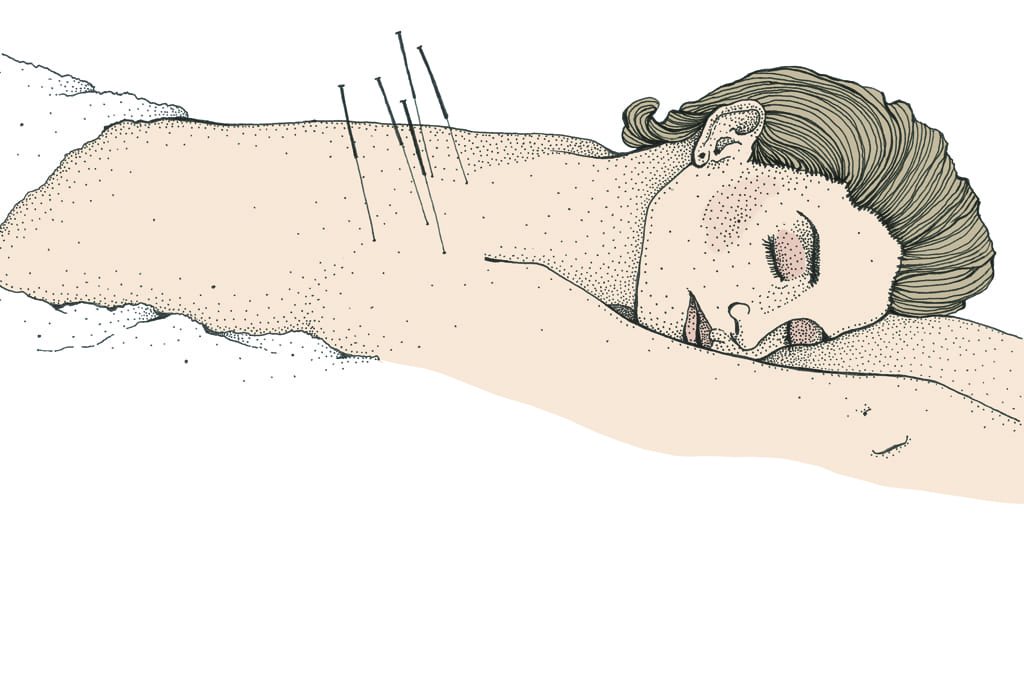What’s the deal with acupuncture?
Acupuncture is a therapy that stems from ancient Chinese medicine. Ultra-fine needles are inserted into specific points of the body for therapeutic or preventive purposes. ‘It’s a holistic practice that seeks out the root cause of illness, and addresses that by balancing internal energy, known as qi (pronounced chee),’ explains Rhiannon Griffiths, integrated acupuncturist and British Acupuncture Council member.
How does it work?
‘It utilises ancient Chinese medicine wisdom and the extensive network of energy channels that flow all over the body, from the top of the head to the tips of the toes,’ say Griffiths. ‘So, very often, points in the feet and hands are used to treat an entirely different part of the body.’
The aim is to address the cause of a patient’s issue, enriching energy that is lacking, or shifting stagnant energy that might be painful.
‘It’s like the needles are giving the body messages – different acupuncture points tell the body different messages with different effects,’ Griffiths adds.
Is there research behind it?
‘There is a growing body of scientific research that proves the efficacy of acupuncture,’ asserts Griffiths. Indeed, the National Institute for Health and Care Excellence (NICE) recommends considering acupuncture as a treatment option for chronic lower back pain, chronic tension-type headaches and migraines; these findings are based upon and supported by medical research conducted by the organisation.
That’s not all – acupuncture can also help keep you hormone-happy. ‘Scientific research has proven that acupuncture stimulates the release of endorphins and oxytocin, leading to a reduction of stress and pain,’ explains Griffiths.
Endorphins are those ‘happy hormones’ released after exercise that make you feel so good post-workout, while oxytocin is released during sex and breast-feeding, which explains its reputation as the ‘cuddle hormone’. By stimulating both these hormones, acupuncture can prove a powerful treatment for depression.
What happens in a session?
Patients undertake a preliminary consultation with their practitioner, which lasts between an hour and a half and two hours.
‘It is important for your acupuncturist to gain a full and accurate view of you and your holistic health. You will be asked questions ranging from your current symptoms and medical and family history, to your diet, digestive system, sleeping patterns and emotional state,’ explains Griffiths.
Follow-up treatments usually last between 45 minutes and one hour, and it is during these sessions that acupuncture needles are inserted into sites specifically prescribed for the patient. Improvement is usually experienced between three and six sessions, although sometimes only one treatment is needed.
In each session, the aim for the patient is to feel a sensation known as deqi. ‘This is when the needle connects with the energy or qi in the channel below the skin; it can feel like a dull ache, a tingle, or a temperature change. We want you to feel this sensation, as this means the needles, which can be left for up to 20 minutes, are doing what we want them to do – regulating and harmonising the body,’ explains Griffiths.
Who can it help?
‘Everyone can benefit from acupuncture, and it is considered safe and suitable for all ages, from babies and children, right through to pregnant women and the elderly,’ says Griffiths. Many people try acupuncture to help specific conditions, but others use it as a preventive measure to maintain their health and wellbeing.
Has acupuncture worked for you? Tweet and share your experiences with us @healthymag








